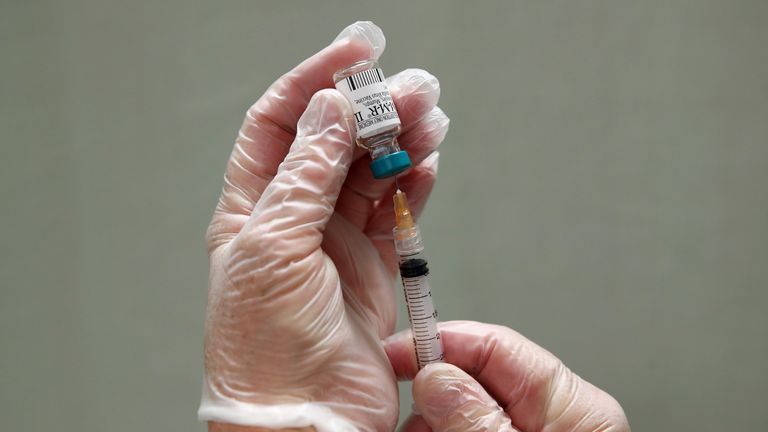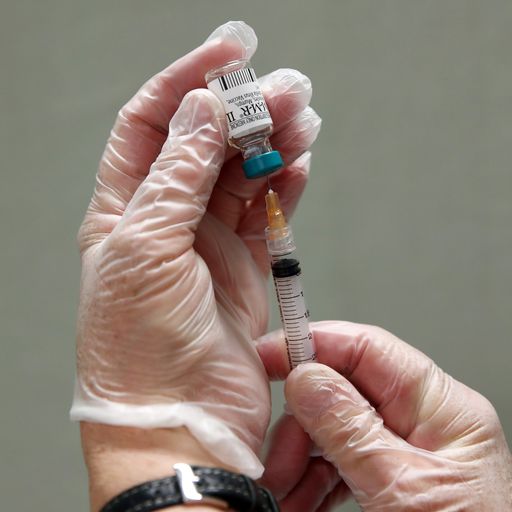Coronavirus: Brazil halts trial of Sinovac vaccine after 'unrelated' death of volunteer
The medical research institute running the trial says it is "surprised" by the move, adding the volunteer's death was unrelated.
Tuesday 10 November 2020 11:11, UK
Brazil's health regulator has halted clinical trials of a coronavirus vaccine being made by Chinese drug firm Sinovac after a "serious adverse effect".
The regulator, Anvisa, did not provide any further details but said the incident took place on 29 October.
"With the interruption of the study, no new volunteer can be vaccinated," a statement on its website read.
The head of Sao Paulo's medical research institute Butantan, which is running the COVID-19 vaccine trials in Brazil, told local TV that a volunteer had died - but not due to the jab.
Dimas Covas said the decision to halt trials was related to the death but said he was "surprised" as the death was "unrelated to the vaccine".
"We found this Anvisa decision strange," he said.
"As there are more than 10,000 volunteers at this moment, deaths can occur... It's a death that has no relation with the vaccine and as such it is not the moment to interrupt the trials."
Sao Paulo state's government also expressed surprise at the decision, saying in a statement it "regrets being informed by the press and not directly by Anvisa, as normally occurs in clinical trials of this nature".
The Butantan Institute would mostly produce the CoronaVac vaccine in Brazil which is being tested in seven states and the federal district, including the capital city, Brasilia.
The jab is also in late stage trials in Turkey and Indonesia.
The trial has already stirred controversy in Brazil, where President Jair Bolsonaro cast doubt on its prospective effectiveness.
Last month, he publicly rejected it, saying Brazilians would not be used as guinea pigs.
The declaration followed news that his health minister, Eduardo Pazuello, had agreed to buy CoronaVac doses produced locally by Butantan.
Despite the government-sparked confusion, Anvisa gave the green light to an import of six million doses from China.
On Monday, Sao Paulo's health secretary, Jean Gorinchteyn, said the first 120,000 CoronaVac shots would arrive at the state's airport on 20 November.
Raw material for the production of 40 million more shots is due to start arriving a week later.
"We will keep following health protocols to give the shots. They will only be taken to the public after a final authorisation from Brazil's health regulator," said Mr Gorinchteyn.
He added that nearly all of the volunteers who were given two doses of the vaccine produced antibodies thought to protect people from the virus.
Starting in July, thousands of employees from Chinese state-owned enterprises already received the vaccine ahead of foreign travel.
A new campaign then extended that offer to the general public, in a handful of cities and towns, with some restrictions in place requiring volunteers to be aged between 18 and 59, and a local resident.
Pausing drug and vaccine tests is a relatively common move that allows researchers to investigate whether an illness is a side effect or not.
:: Subscribe to the Sophy Ridge podcast on , , ,
Last month, two drug-makers resumed testing of their prospective coronavirus vaccines in the US after they were halted.
The Sinovac issues come as other COVID-19 vaccines around the world are showing promising progress.
On Monday, it was announced that one being developed by Pfizer and BioNTech has been 90% effective in preventing infection.
The UK's Health Secretary Matt Hancock told Sky News the NHS has been asked to be ready to deploy that vaccine as early as December.










